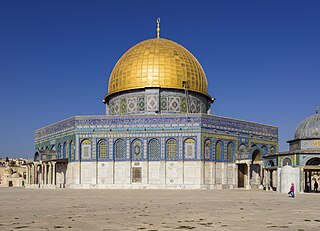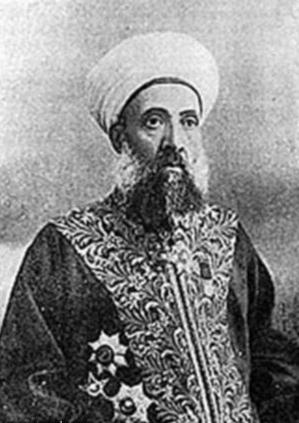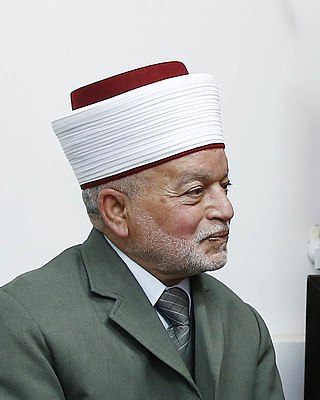
In Islam, the ulama, also spelled ulema, are scholars of Islamic doctrine and law. They are considered the guardians, transmitters, and interpreters of religious knowledge in Islam.

Mohammed Amin al-Husseini was a Palestinian Arab nationalist and Muslim leader in Mandatory Palestine. Al-Husseini was the scion of the al-Husayni family of Jerusalemite Arab nobles, who trace their origins to the Islamic Prophet Muhammad.

The 1920 Nebi Musa riots or 1920 Jerusalem riots took place in British-controlled part of Occupied Enemy Territory Administration between Sunday, 4 April, and Wednesday, 7 April 1920 in and around the Old City of Jerusalem. Five Jews and four Arabs were killed, and several hundred were injured. The riots coincided with and are named after the Nebi Musa festival, which was held every year on Easter Sunday, and followed rising tensions in Arab-Jewish relations. The events came shortly after the Battle of Tel Hai and the increasing pressure on Arab nationalists in Syria in the course of the Franco-Syrian War.
A qāḍī is the magistrate or judge of a sharīʿa court, who also exercises extrajudicial functions such as mediation, guardianship over orphans and minors, and supervision and audition of public works.
The Supreme Muslim Council was the highest body in charge of Muslim community affairs in Mandatory Palestine under British control. It was established to create an advisory body composed of Muslims and Christians with whom the High Commissioner could consult. The Muslim leaders, however, sought to create an independent council to supervise the religious affairs of its community, especially in matters relating to religious trusts (waqf) and shariah courts. The British acceded to these proposals and formed the SMC which controlled waqf funds, the orphan funds, and shariah courts, and responsible for appointing teachers and preachers. The SMC continued to exist until January 1951, when it was dissolved by Jordan and its function transferred to the Jordanian Ministry of Awqaf.

Musa Kazim Pasha al-Husayni held a series of senior posts in the Ottoman administration. He belonged to the prominent al-Husayni family and was mayor of Jerusalem (1918–1920). He was dismissed as mayor by the British authorities and became head of the nationalist Executive Committee of the Palestine Arab Congress from 1922 until 1934. His death was believed to have been caused by injuries received during an anti-British demonstration.

Islam is the second-largest religion in Israel, constituting 1.707 million and around 18.1% of the country's population as of 2022. The ethnic Arab citizens of Israel make up the majority of its Muslim population, making them the largest minority group in Israel.

Sunni Islam is a major religion in Palestine, being the religion of the majority of the Palestinian population. Muslims comprise 85% of the population of the West Bank, when including Israeli settlers, and 99% of the population of the Gaza Strip. The largest denomination among Palestinian Muslims are Sunnis, comprising 98–99% of the total Muslim population.

Husayni is the name of a prominent Palestinian Arab clan formerly based in Jerusalem, which claims descent from Husayn ibn Ali.
Mohammed Tahir Mustafa Tahir al-Husayni was the Qadi of the Sharia courts of Jerusalem and was the father of Kamil al-Husayni and Mohammad Amin al-Husayni, both of whom held the equivalent position in the British mandated period of Grand Mufti of Jerusalem.

Hussam al-Din Jarallah was a Sunni Muslim leader of the Palestinian people during the British Mandate of Palestine and was the Grand Mufti of Jerusalem from 1948 until his death.

Kamil al-Husayni was a Sunni Muslim religious leader in Palestine and member of the al-Husayni family. He was the Hanafi Mufti of Jerusalem from 1908, and in 1918 the British Mandate authorities appointed him as the first “Grand Mufti of Jerusalem“, a title they had copied from the Grand Mufti of Egypt. The British referred to him as “the representative of Islam in Palestine and a member of the oldest nobility of the country”.

Sheikh As'ad Shukeiri was a Palestinian religious scholar political leader and mayor of Acre, and the Ottoman-appointed Qadi from 1914 to 1918. Kamil al-Husayni was the Hanafi Mufti at the time and considered to be pro-British. Shukeiri was pro-Ottoman, favoring that Palestine continue to be part of the Ottoman Empire and in 1908 and 1912, he was elected to the Ottoman parliament.
Khayr al-Din ibn Ahmad ibn Nur al-Din Ali ibn Zayn al-Din ibn Abd al-Wahab al-Ayubi al-Farooqui (1585–1671), better known as Khayr al-Din al-Ramli, was a 17th-century Islamic jurist, teacher and writer in then Ottoman-ruled Palestine. He is well known for issuing a collection of fatwas that became highly influential in Hanafi jurisprudence in the 18th and 19th centuries.
Mahmud Qabadu (1812–1872) of Tunisia, also Muhammad Qabadu, was a scholar of Quranic studies, a progressive member of the ulama, a long-time professor at the Zaytuna mosque academy, and a poet. Shaykh Mahmūd Qabādū served as a qadi to the chief judge and latter as mufti in Tunis.

The Grand Mufti of Jerusalem is the Sunni Muslim cleric in charge of Jerusalem's Islamic holy places, including Al-Aqsa. The position was created by the British military government led by Ronald Storrs in 1918. Since 2006, the position has been held by Muhammad Ahmad Hussein, appointed by the Palestinian President, Mahmoud Abbas.

Palestinian nationalism is the national movement of the Palestinian people that espouses self-determination and sovereignty over the region of Palestine. Originally formed in opposition to Zionism, Palestinian nationalism later internationalized and attached itself to other ideologies; it has thus rejected the occupation of the Palestinian territories by the government of Israel since the 1967 Six-Day War. Palestinian nationalists often drawn upon broader political traditions in their ideology, examples being Arab socialism and ethnic nationalism in the context of Muslim religious nationalism. Related beliefs have shaped the government of Palestine and continue to do so.
Naqib al-ashraf was a governmental post in various Muslim empires denoting the head or supervisor of the descendants of the Islamic prophet Muhammad. The descendants of Muhammad were known as ashraf and throughout Islamic history, the ashraf organized themselves into large groups, akin to corporations, throughout the various Muslim territories. This was done to ensure their special place in Muslim society and thus maintain their socio-political privileges.
The Naqib al-Ashraf revolt was a popular uprising in Jerusalem against the Ottoman authorities between May 1703 and October 1705. It was led by the city's naqib al-ashraf, Muhammad ibn Mustafa al-Husayni al-Wafa'i, and the rebels consisted of townspeople, peasants from nearby villages, local Bedouins, and religious notables (ulama). For over two years the rebels engaged in virtual self-rule in the city. However, divisions emerged within rebel ranks, and following an Ottoman siege, the rebel camp led by al-Husayni fled the city and were later captured and executed.
Muhammad Bakhit al-Muti'i was the Grand Mufti of Egypt, judge in the Shari'a Courts, rector of al-Azhar, and one of the leading Hanafi-Maturidi scholars of his time. He was educated at al-Azhar and was teaching in this university for several years. In 1914 he was appointed mufti, a title he held for seven years. He was known as the bitterest foe of the Islamic Reform movement led by Jamal al-Din al-Afghani and Muhammad 'Abduh. He was also known as a devout scholar who chose to lose his position as mufti rather than bow to government pressure to issue a particular fatwa.











